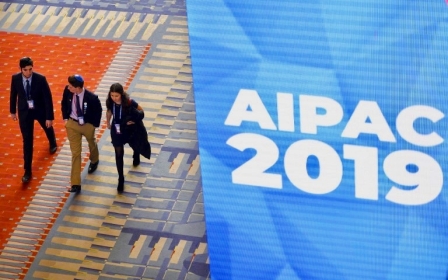No mention of Palestinians or Israeli settlements, as Democrats take AIPAC stage

The top Democrats in Congress have addressed the conference of AIPAC, narrating anecdotes of personal connections to Israel, condemning anti-semitism and vowing to maintain bipartisan support for the Middle East country.
Missing from their speeches, however, was any reference to Palestinians or criticism of Israeli policies that undermine the two-state solution that they claim to support, including the expansion of Israeli settlements in the West Bank.
Speaking at the annual conference of the pro-Israel lobby, House Speaker Nancy Pelosi and Senate Minority Leader Chuck Schumer both dismissed the notion that Democratic support for Israel is dwindling.
Their presence at the conference came amid several notable absences, as top Democratic presidential candidates skipped the event after calls from progressive groups.
New MEE newsletter: Jerusalem Dispatch
Sign up to get the latest insights and analysis on Israel-Palestine, alongside Turkey Unpacked and other MEE newsletters
What is the AIPAC conference?
+ Show - HideThe American Israel Public Affairs Committee (AIPAC) is a pro-Israel lobby group based in the United States.
AIPAC bills itself as "a bipartisan organisation of US citizens committed solely to strengthening, protecting and promoting the US-Israel relationship".
The group has hosted a national policy conference every year since 1960, attracting some of the most powerful people and groups across the US.
In 1995, Bill Clinton became the first sitting US president to address the AIPAC summit.
Former US presidents George W. Bush and Barack Obama also spoke at the event during their time in the White House, while major politicians from both the Democratic and Republican parties attend the event each year.
The influence AIPAC wields on US politics came under increased scrutiny when Obama was president, after Israeli Prime Minister Benjamin Netanyahu addressed the US Congress without an official invitation from the Obama administration.
Many Democratic lawmakers boycotted Netanyahu's speech at the time, signalling a rift between pro-Israel lobbyists and some Democratic lawmakers, who saw the Israeli premier's speech as a clear insult to the US's first black president.
In response to the clear animosity between Obama and Netanyahu, AIPAC sought to ensure that support for Israel remains bipartisan in Washington.
AIPAC officials, including the group's president, issued an apology in 2016 after then-presidential candidate Donald Trump attacked Obama as "maybe the worst thing to happen to Israel" during his speech at that year's AIPAC conference.
"While we may have policy differences, we deeply respect the office of president of the United States and our president, Barack Obama," AIPAC President Lillian Pinkus said after Trump's address.
In fact, last month AIPAC said it was "proud [to be] engaged in the democratic process to strengthen the US-Israel relationship".
"Our bipartisan efforts are reflective of American values and interests. We will not be deterred in any way by ill-informed and illegitimate attacks on this important work," the group said on Twitter.
However, this year's AIPAC conference comes amid renewed criticism of the group's influence.
Democratic Congresswoman Ilhan Omar last month said she wanted to discuss the pressure in Washington to pledge "allegiance to a foreign country", referring to the pro-Israel lobby.
Her comments drew accusations of anti-Semitism, but many Jewish- and Muslim-American activists quickly came to her defence, saying the attacks against Omar were part of a concerted effort to curb debate around the Israeli-Palestinian conflict.
While top Democratic presidential candidates are skipping this year's conference, members of the party's old guard, including House Majority Leader Steny Hoyer, attended the summit in Washington.
Hoyer even slammed Omar, his Democratic Party colleague, in a speech at the conference on 24 March, pledging to maintain unequivocal US support for Israel.
US Vice President Mike Pence and Benny Gantz, an ex-Israeli army chief and the top challenger running against Netanyahu in next month's elections in Israel, also spoke at the conference on 25 March.
Some Democrats' reluctance to attend the AIPAC conference was used by Republicans, including US Vice President Mike Pence, to accuse their rival party of abandoning Israel.
Not so, said Pelosi, the top Democrat in Congress.
"Assistance to Israel is vital, and it's not going anywhere because if you care about American security, you must care about Israel's security," she said on Tuesday.
'Not going anywhere'
In her speech at the AIPAC conference, Pelosi said America "must ensure" that Israel maintains its qualitative military edge in the region.
She pledged that the US House of Representatives, which is held by Democrats, would soon "overwhelmingly" pass an Israel aid package that would give the country $3.5bn annually over a decade.
Pelosi also slammed the Boycott, Divestment and Sanctions (BDS) movement, which seeks to pressure Israel - economically and politically - to end its human rights abuses against Palestinians.
She called BDS a "bigoted and dangerous" ideology "masquerading as policy", endorsing a proposed symbolic House resolution to condemn BDS.
Schumer also condemned BDS and stressed the need for bipartisan support for Israel, in a speech to the AIPAC conference delegates late on Monday.
But he appeared to acknowledge that many are starting to question the US-Israel relationship, saying "too many of our younger generation don't have the same understanding of the threats facing Israel as my generation did".
"That's a fundamental problem we must confront head-on," Schumer said.
Democrats still support Israel
However, Schumer said the "overwhelming majority of Democrats" support Israel, pointing to numerous pro-Israel bills that were almost unanimously backed by Democratic lawmakers.
With the rise of progressive Democrats critical of AIPAC, President Donald Trump has accused the party of being hostile to Israel, calling on Jewish-Americans to vote for Republicans instead.
On Monday, Schumer responded to the president without explicitly mentioning him.
"Not only is it demonstrably false to say that Democrats are anti-Israel, it also hurts the Israel-US relationship," he said.
Several top Republicans have also recently accused the Democratic Party of tolerating anti-Semitism and abandoning Israel, in a bid to sow divisions between the party's centrist old guard and its progressive base.
On Monday, Vice President Pence called out 2020 Democrats who did not show up to the conference.
"So let me be clear on this point: Anyone who aspires to the highest office in the land should not be afraid to stand with the strongest supporters of Israel in America," Pence said.
Later in the day, Schumer warned Republicans against using Israel to "score political points", saying that transposing political divisions in Washington to Israeli-US relations does a "disservice" to both countries.
The senator followed in the footsteps of many speakers at AIPAC this year by taking a swipe against Congresswoman Ilhan Omar, without naming her directly.
Omar has recently been the subject of outrage for saying that the pro-Israel lobby drives support to Israel through financial contributions to elected officials in Washington and pushes for "allegiance [to] a foreign country".
'When someone looks at a neo-Nazi rally and sees some 'very fine people' among its company, we must call it out'
- US Senator Chuck Schumer
While Omar repeatedly said she didn't mean that Jewish-Americans are not loyal to the US, her detractors have maintained that the remarks constitute a charge of dual loyalty against Jews, an anti-semitic trope.
"When someone says that being Jewish and supporting Israel means you’re not loyal to America, we must call it out ... When someone suggests that money drives support for Israel, we must call it out," Schumer said on Monday.
He added that lobbying for Israel does not make one less American, but rather a better citizen.
Netanyahu lauds Trump
Schumer followed up his implicit criticism of Omar by calling out Trump for failing to condemn white supremacists after a violent rally for neo-Nazis in Charlottesville in 2017.
In the aftermath of the confrontation between neo-Nazis and anti-racist activists, which left one anti-racism activist dead, Trump said there were "very fine people" on both sides.
"When someone looks at a neo-Nazi rally and sees some 'very fine people' among its company, we must call it out," Schumer said.
Addressing AIPAC on Tuesday morning, Israeli Prime Minister Benjamin Netanyahu also denounced Omar, saying that support for Israel is not driven by money as the congresswoman suggested.
"Take it from this Benjamin, it's not about the Benjamins," he said in a video message to the conference.
However, unlike Schumer, he did not denounce the US president, but rather, lavished praise on him.
"On behalf of all the people of Israel, thank you, President Trump, and thank you for all the historic decisions you have made," Netanyahu said.
Middle East Eye delivers independent and unrivalled coverage and analysis of the Middle East, North Africa and beyond. To learn more about republishing this content and the associated fees, please fill out this form. More about MEE can be found here.




